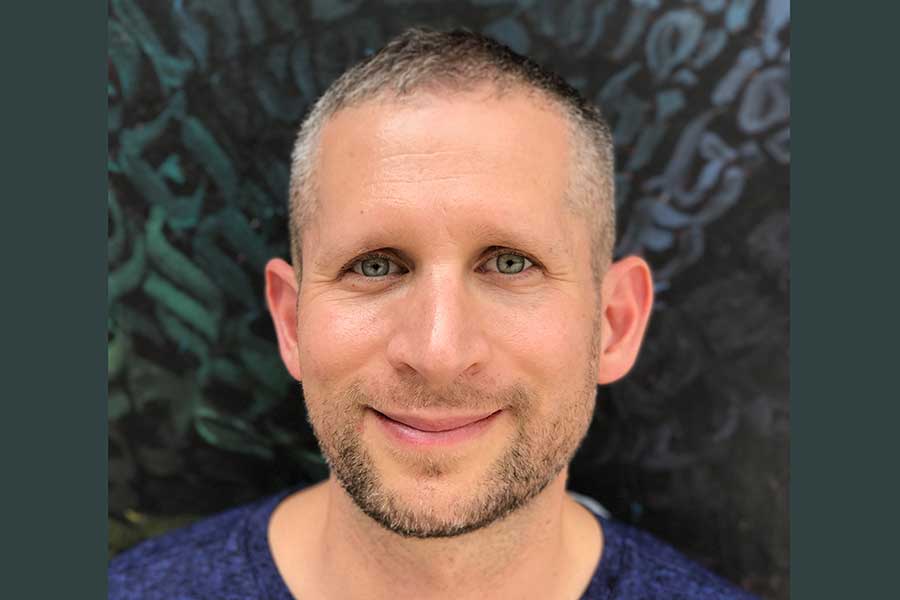In theater circles in the U.K. and U.S., Tim Levy is a living legend.
After having hit after hit on New York City’s Great White Way with Brit imports, the producer at London’s acclaimed National Theatre opened an American branch of the company, creating a direct pipeline where he could oversee touring American productions of English stage sensations, and returning such favor with U.S.-to-U.K. shows. Levy’s newest event is “The Curious Incident of the Dog in the Night-Time,” which rolls out at the Academy of Music starting Feb. 28, at the tail end of the Free Library’s One Book One Philadelphia program.
The colorful, experimental play, based upon the 2003 mystery novel of the same name by British author Mark Haddon, quotes Sherlock Holmes’ (well, Arthur Conan Doyle’s) 1892 short story “Silver Blaze”; features first-person narration by its 15-year-old hero, Christopher John Francis Boone (“a mathematician with some behavioral difficulties” related to Asperger’s Syndrome and high-functioning autism); and is ultimately the greatest tale of an outsider the 21st century has produced so far.
PGN: How did you go from bringing British theater to Broadway on a semi-regular basis to this constant stream of ideas and talent?
TL: Well, as an example, we started “Curious Incident” in London five years ago in our smallest theater in the National — 350 seats — and nurtured it. It was astonishing to watch it grow, to see how popular it became, so much so that we had to move it to our West End. After we did that, there was a thought and a hope: that our really wonderful experience we had bringing other National Theatre shows to America, such as “War Horse” and “History Boys,” would work with “Curious Incident,” that it would be embraced by Americans as they were. You never really know what audiences — let alone, American audiences —will respond to, so you’re always taking a chance, especially with a play as opposed to a dazzling musical.
PGN: Why open National Theatre America in the first place?
TL: We opened an office in America because we had been bringing British shows steadily to the states for years and — though we worked with brilliant American producing partners and still do on occasion — we simply wished to oversee it ourselves. That made sense as I was here and loved America. I was always in Manhattan. I have cousins in Michigan. I simply had this love affair with America. For National Theatre America, rather than have me just swoop in at a show’s start then swoop back to London and let the shows fend for themselves, I could stay here and become part of the American ecosystem, likewise the productions. Also, knowing that in New York City we see as much American theater as we can and meet with as many American theater artists as possible, we have crafted a two-way-street. In that way, we can bring as much great American theater to London as we do the other way around, and create an additional conversation, a new dialogue.
PGN: I should ask as you’re speaking to PGN, What is your relationship status?
TL: I am indeed married to an American man — six years now. We met a month after I moved to America 10 years ago, and we’ve never separated.
PGN: I went to school at the National and grew up with the British greats such as Alan Ayckborn and Jonathan Price. Seeing and hearing their works and ideas transferred to the Americas then seemed elegantly esoteric. Is that less the case now, as you tour the very-English “One Man, Two Guvnors” with James Cordon or “The History Boys”?
TL: When you bring over a show that is really British or really relishes that British-ness, often America embraces those productions. The more English, the better. Look at how America ate up “Downton Abbey.” There’s a real love in addressing what it means to be English or live as Englishmen and women; the more culturally specific, the more intriguing. You look too to the comparisons that exist here; whether it has a correlation to something that Americans can relate to, that’s when a show becomes truly universal.
PGN: How did you get to Mark Haddon’s novel in the first place?
TL: We have a resource at the National called the National Development Studio, where all of our new projects reside. Dozens of different artists work there at one time and we just happened to have both Haddon developing one work and Simon Stephens doing a different work, and they became fast friends. Mark said quietly to Simon after so many others wanted to do so, if Simon would attempt to make “Curious Incident” into a play. That’s how it happened, totally artist-driven.
PGN: The play is not solely about autism, yet it touches upon its themes. What challenge did this present?
TL: We wanted to honor what Mark had and said, that vivid and beautiful creation of the inside of the mind of a boy whose mind is completely different, and on the autism spectrum without defining it. Haddon is not a fan of labels. From there, we wanted to take the audience on a unique trip and find the most theatrical way of telling such in its design, choreography, projection and music — a full sensory immersion. It looks as if a spaceship has landed with a grid-like design that bends to Christopher’s imagination. If he believes we’re in space, the set becomes the cosmos. If he believes we’re in a desert, we’re in a desert. That’s a fertile imagination.
“The Curious Incident of the Dog in the Night-Time” runs Feb. 28-March 5 at Kimmel’s Academy of Music, 240 S. Broad St. For more information or tickets, visit www.kimmelcenter.org.

